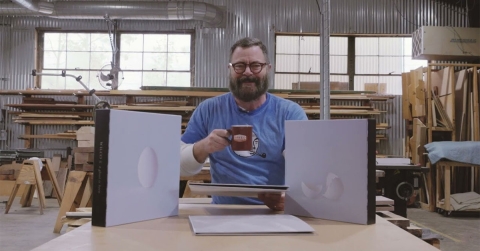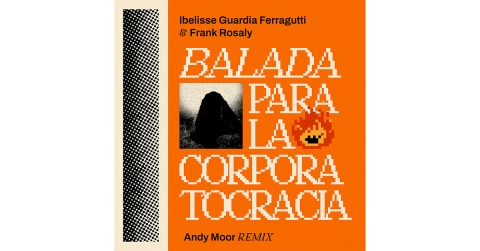A three-LP/CD box set of albums from the great Argentine composer, bandleader, and bandoneón player Astor Piazzolla originally released by American Clavé Records in the 1980s later reissued by Nonesuch is out now. Astor Piazzolla: The American Clavé Recordings marks the first time this landmark trio of albums—Tango: Zero Hour, La Camorra, and The Rough Dancer and the Cyclical Night (Tango Apasionado)—is available as a set, now remastered, and the first time the albums have been available on vinyl since their initial American Clavé release. The set features original and new notes by the albums' producer and American Clavé founder Kip Hanrahan and an essay from journalist Fernando González. Uncut exclaims: "On its own, each album makes a fine introduction to Piazzolla's music, but together, they comprise a monumental contribution to world music."
Nonesuch Records releases a three-LP/three-CD box set of albums from the great Argentine composer, bandleader, and bandoneón player Astor Piazzolla—originally released by American Clavé Records in the 1980s and reissued by Nonesuch more than two decades ago—today. Astor Piazzolla: The American Clavé Recordings, available here, marks the first time this landmark trio of albums—Tango: Zero Hour, La Camorra: The Solitude of Passionate Provocation, and The Rough Dancer and the Cyclical Night (Tango Apasionado)—is being issued as a set, now remastered, and is the first time the albums have been available on vinyl since their initial release on American Clavé. The set’s liner notes include original and new notes by the albums’ producer and American Clavé founder Kip Hanrahan as well as an in-depth essay from journalist Fernando González, who translated and annotated Piazzolla’s memoirs and wrote liner notes for four of his albums. Originally scheduled for release in Piazzolla’s centenary year 2021, the set now inaugurates the beginning of the second century of Piazzolla’s lasting influence.
Uncut exclaims: "On its own, each album makes a fine introduction to Piazzolla’s music, but together, they comprise a monumental contribution to world music."
You can take a quick look inside the box here:
González says in his 2021 note: “In May 1986, Astor Piazzolla, the creator of New Tango, entered the studio in Manhattan with his Quintet to record Zero Hour. It would turn out to be the first of three consequential recordings that would finally establish him in the United States and strengthen his standing around the world.”
Though Piazzolla was known as the progenitor of “nuevo tango,” Hanrahan says in his new liner note, “I’m not sure whether Astor really liked or loved or hated the tango. I think he loved the music his father surrounded the family with as the sound of what they’d left behind in Argentina … It was the audible identity that made them different from the Italian and Jewish families that lived around them on the Lower East Side of New York, where Astor grew up.
“When I listen to Astor, I’m not really listening to the tango re-imagined and saved by a brilliant composer, I’m listening to the music of a turbulent, complex, restless, brilliant man rearranging the vocabulary of his father’s dreams.”
Tango: Zero Hour was recorded in New York with Piazzolla and his classic New Tango Quintet, which worked with Piazzolla from 1978 to 1988 and included Fernando Suárez Paz (violin), Pablo Ziegler (piano), Horacio Malvicino, Sr. (guitar), and Héctor Console (bass). González says of Tango: Zero Hour: “These are demanding pieces, yet the individual playing remains consistently precise and intense throughout. As an ensemble, Piazzolla and his New Tango Quintet sound focused, loose and forceful. They are in total control of the music and prove it by casually changing direction, moods, and dynamics on a dime. Piazzolla immediately recognized that the quintet had accomplished something special, believing it to be ‘the greatest record I’ve made in my entire life. We gave our souls to [it].’” Tango Zero Hour was originally released by American Clavé in 1986.
First released in 1989, La Camorra was recorded in New York in May 1988, also with the New Tango Quintet. González writes: “La Camorra not only delivers a late masterpiece, the three-part title piece, but it also serves as a marker completing two significant chapters in Piazzolla’s life and musical career. Set up as three separate but related pieces, La Camorra is more than a summation. It suggests Piazzolla reflecting on tango, now lovingly, conjuring old players and styles, now angrily fighting with tango history, demanding his place in it.
“In Zero Hour style, Piazzolla completes the program with versions of pieces he had already recorded, polished to a gleam. The Quintet is again in excellent form. Featuring a substantial new work and impeccable performances of four repertoire pieces, La Camorra is a high water mark in Piazzolla’s discography. It was also Piazzolla’s last recording with the New Tango Quintet.”
The Rough Dancer and the Cyclical Night, also originally released in 1989, was recorded in New York in September 1987, with an ensemble that included Fernando Suárez Paz (violin), Pablo Zinger (piano), Paquito D’Rivera (alto sax, clarinet), Andy González (bass), and Rodolfo Alchourrón (electric guitar).
González says, “The Rough Dancer and the Cyclical Night (Tango Apasionado), recorded by Piazzolla without the Quintet, occupies a unique place in his discography. It is based on the music Piazzolla composed for Tango Apasionado, a dance and theater piece created by Graciela Daniele based on stories by Argentine short-story writer, poet, and essayist Jorge Luis Borges. But what truly sets The Rough Dancer apart in Piazzolla’s discography is how it was created. Up to this point, the studio for Piazzolla had been, for the most part, a means to document the music he was producing. But [at this point], Piazzolla was intrigued by the idea of using the studio as a creative tool, perhaps even for composing and arranging.”
Astor Piazzolla’s nuevo tango, which incorporates classical forms and jazz elements into the traditional tango, was so controversial at its advent that Piazzolla had his life threatened on numerous occasions and was even exiled from his country. The traditional tango, born out of the bordellos of Buenos Aires in the way that jazz began in New Orleans, had been haunted by its origins for decades. Piazzolla, with his innovative style and desire to legitimize the tango and bring it to a serious musical audience, changed the face of the music forever.
When Tango: Zero Hour was first released, Piazzolla was at the peak of his powers. The Village Voice called Piazzolla “a modern master” while the New York Times said, “To hear Mr. Piazzolla’s tangos as musical marvels is beside the point. As edgy lines and long-breathed tunes defy and embrace one another, the tangos suggest that even in the modern world, romance survives.”
Nonesuch’s Piazzolla catalog features a number of other significant recordings, including Piazzolla’s Concierto para bandoneón and Tres tangos, released in 1988, and his last recording, Five Tango Sensations, which was commissioned by the Kronos Quartet and released in 1991. In addition, Piazzolla’s first composition for Kronos, Four, For Tango, appears on their 1988 release Winter Was Hard. The music of Piazzolla is also featured on three Nonesuch recordings by the violinist Gidon Kremer: Hommage à Piazzolla, El Tango, Eight Seasons, and Tracing Astor; these also were released as a box set, entitled Hommage à Piazzolla: The Complete Astor Piazzolla Recordings.
- Log in to post comments



